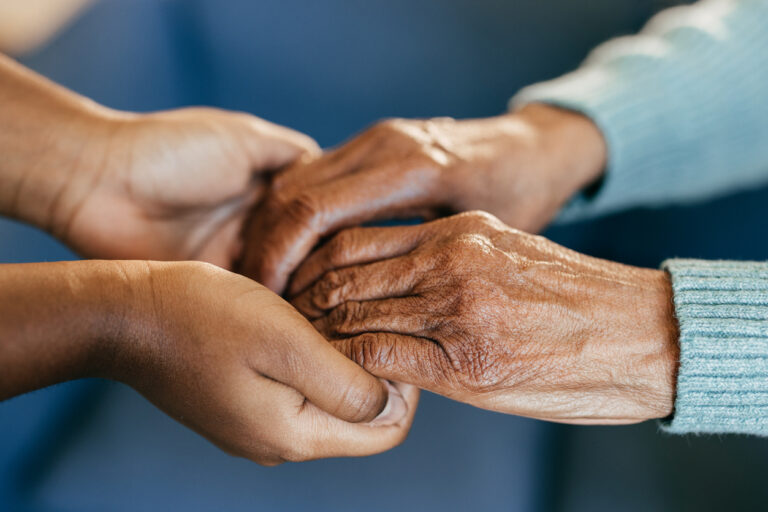Related Articles
Subscribe to the Greater Public newsletter to stay updated.
This site is protected by reCAPTCHA and the Google Privacy Policy and Terms of Service apply.


My grandmother’s name is Frances Branch, born on Halloween, 1927. The last conversation I had with my grandmother before her passing was an informative one. It was out of character for the most part because talking about the past was usually a painful proposition for her. On many occasions, when I would ask about her childhood, she opted not to talk about it. Asking didn’t work, but when she volunteered, I listened.
She told me that when she was a young girl, her great-grandmother lived with her briefly, and I was amazed when she said that her great-granny was a once enslaved woman. She talked to me about the amount of struggle and poverty growing up in the rural Jim Crow South, but one thing was always a constant: No matter how little she and her family had, every Sunday, they found a way to give. In the Jim Crow South, the church wasn’t just a church. It was a community center where we could speak truthfully, plan and strategize.
I think of my grandmother when entering into the fundraising community for the South Carolina PBS affiliate SCETV.
It was a challenging time, but challenges became opportunities during my granny’s tenure. In public media, I’ve noticed a void in the conversation regarding giving. Our station hires consultants to come in, pull our charts, and tell us statistics that everyone seems to hear in the same way: Your donors are going to be white guys in their 50s-60s, full stop.
I’ve begun to push back, not necessarily on the data because I assume the numbers are accurate based on the samples they may be looking into. But what about my granny?
I think about the countless Black women and men who not only gave but gave when they didn’t have much. I reference my interactions with author Valaida Fullwood with her book “Giving Back: A Tribute to Generations of African American Philanthropists,” which chronicles the generations-old tradition of Black giving in America.
A local art gallery in my city of Columbia, South Carolina, was one of many across the country that hosted the accompanying exhibit to “Giving Back”: “Soul of Philanthropy.” The exhibit was full of images from the book by photographer Charles W. Thomas, Jr., showing black and white photography and stories from Black givers. The book’s cover displays weathered Black hands that can tell a story. Hands that my grandmother had (cue Bill Withers’ “Grandma’s Hands”).
This project’s “chronicling of generosity” confirms what countless Black people, and I, know: The African-American community understands giving, though many are not acknowledged as the philanthropists they are. It is a deeply ingrained practice, from giving circles to faith-based traditions and even quarter parties, more commonly known as “rent parties.” For those unaware: If you live in an apartment building, other tenants will bring food, drinks, and music and charge money at the door. You’ll get the proceeds of the money to go towards your bills, and the following month, you can make a dish or bring some items to help your neighbor do the same thing.
During a recent South Carolina Public Radio campaign, I was tasked with writing more than 50 fundraising scripts asking people to “donate now to insert-number-that-I-now-hear-in-my-sleep.” As the task became stale, I couldn’t help but think of my grandmother. To invigorate the scripts, I decided to go to people in the community to ask them: “Why do you give?”
And when people responded, “I don’t give to public media,” I was not deterred.
I responded, “I don’t care if you give to our radio station. I want to know why do you give? Whatever nonprofit, organization or cause. What makes you give?”
I asked for honest feedback on what motivates someone to pull out their wallet. Asking for money from people who are not well-endowed financially is a personal act. It’s not a box to check for taxes; it’s an intimate decision. And for people to express their views honestly is a trust that goes beyond just producing a spot for radio.
That reverse engineering did two things: 1. It allowed the community to tell the listening public in their own words what motivates them to give, and 2. I learned from Black givers the most important reason for giving more than anything else: responsibility.
I think of my family in the South and my grandmother growing up in the Jim Crow South. To white folks from the South, voting may be a right. But to people like my grandmother, it was beyond that. It was a deployment. She was duty-bound to combat a system designed to keep her voice muffled. From voter suppression and gerrymandering, for her voice to be heard was nothing short of a revolutionary act.
BIPOC givers know what media looked like before they could see reflections of themselves on-screen or on-air. If public media programming reflects the diversity of their community, you will not find more dedicated philanthropists to ensure these places have the support they need.
I implore you to find the Frances Branches of the world. We all will be better for it.

View these related member resources and more with a Greater Public membership:
This site is protected by reCAPTCHA and the Google Privacy Policy and Terms of Service apply.
New to Greater Public? Create an account.
